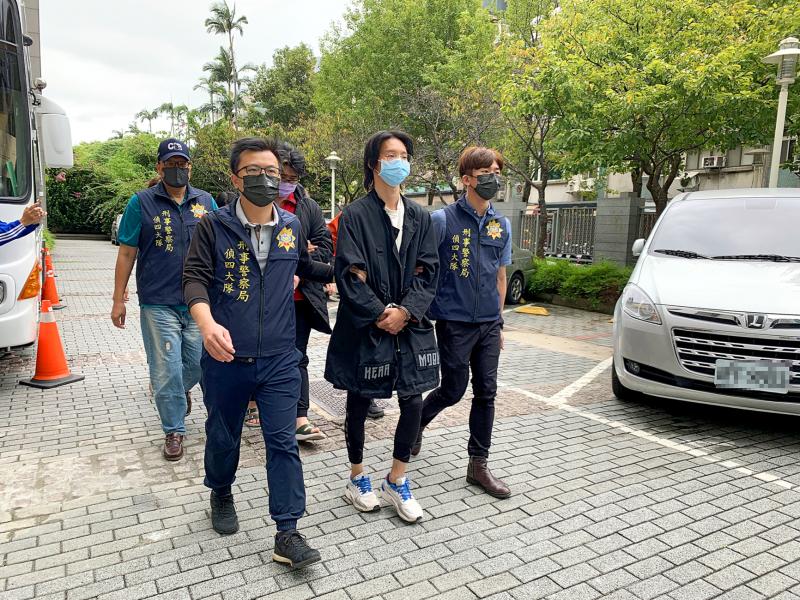A Taiwanese YouTuber suspected of creating and selling deepfake porn videos featuring more than 100 politicians and influencers was on Monday released on bail after being arrested the previous day.
Chu Yu-chen (朱玉宸), 26, who uses the name Xiaoyu (小玉) on YouTube, was arrested on Sunday in New Taipei City, along with two suspected accomplices, a 24-year-old YouTuber surnamed Yeh (耶), known as Shaiw Shaiw (笑笑), and a 22-year-old man Chuang (莊).
The three suspects were on Monday escorted to the New Taipei District Prosecutors’ Office for further questioning on suspicion of distributing obscene videos and publicly insulting others, in contravention of the Criminal Code.

Photo: CNA
A conviction for distributing obscene videos carries a maximum sentence of two years in prison, which can be converted or added to a NT$90,000 (US$3,222) fine, while a public insult conviction could result in a fine of up to NT$9,000.
New Taipei City Deputy Chief Prosecutor Nieh Chung (聶眾) said that while the alleged crimes were serious, it was not necessary to detain the suspects.
He said the office originally set Chu’s bail at NT$500,000 and Chuang’s at NT$100,000, but because their assets were frozen, they were released on NT$300,000 and NT$50,000 bail respectively on Monday evening.
Yeh was released without bail, Nieh said, without elaborating.
The three are believed to have made more than NT$11 million over the past year by creating and distributing the videos, which were made by superimposing people’s faces onto existing pornographic videos using deep learning technology, the Criminal Investigation Bureau (CIB) said.
The videos make it seem as if the celebrities themselves are engaging in the sexual acts depicted. They are controversial, as the likenesses of those involved are usually used without their consent, it said.
Deputy Commander of the 4th Investigation Corps Ko Chih-jen (柯志仁) told a CIB briefing on Monday that pornographic videos featuring famous Taiwanese politicians and influencers began circulating online in July last year.
Chu operated the social media pages and was in charge of editing the videos, Chuang looked for video materials that could be used and Yeh dealt with the finances, a CIB investigation showed.
President Tsai Ing-wen (蔡英文) voiced her concern about the issue of deepfakes, saying that her administration would evaluate existing regulations and draft relevant amendments.
Minister of Justice Tsai Ching-hsiang (蔡清祥) yesterday told legislators that the ministry has begun drafting related amendments and hoped to submit them to the legislature within a month.
Kaohsiung City Councilor Huang Jie (黃捷), one of the people whose faces were used in the videos without their consent, said on Facebook on Monday that she had filed legal proceedings against the suspects.
She said nine other victims, all of whom are female video game streamers, had messaged her about the videos and said they would also be pressing charges.
Huang said she felt disgusted and afraid when she saw the videos herself, and indicated that the videos had caused real harm and humiliation to the victims.
Legislator Kao Chia-yu (高嘉瑜), whose face was also used without her consent in the videos, said on Facebook that she would pursue legislation that specifically targets deepfakes, as Taiwan’s existing laws are inadequate to deal with the issue.

‘FORM OF PROTEST’: The German Institute Taipei said it was ‘shocked’ to see Nazi symbolism used in connection with political aims as it condemned the incident Sung Chien-liang (宋建樑), who led efforts to recall Democratic Progressive Party (DPP) Legislator Lee Kun-cheng (李坤城), was released on bail of NT$80,000 yesterday amid an outcry over a Nazi armband he wore to questioning the night before. Sung arrived at the New Taipei City District Prosecutors’ Office for questioning in a recall petition forgery case on Tuesday night wearing a red armband bearing a swastika, carrying a copy of Adolf Hitler’s Mein Kampf and giving a Nazi salute. Sung left the building at 1:15am without the armband and apparently covering the book with a coat. This is a serious international scandal and Chinese

PERSONAL DATA: The implicated KMT members allegedly compiled their petitions by copying names from party lists without the consent of the people concerned Judicial authorities searched six locations yesterday and questioned six people, including one elderly Chinese Nationalist Party (KMT) member and five KMT Youth League associates, about alleged signature forgery and fraud relating to their recall efforts against two Democratic Progressive Party (DPP) legislators. After launching a probe into alleged signature forgery and related fraud in the KMT’s recall effort, prosecutors received a number of complaints, including about one petition that had 1,748 signatures of voters whose family members said they had already passed away, and also voters who said they did not approve the use of their name, Taipei Deputy Chief Prosecutor

UNDER ATTACK: Raymond Greene said there were 412 billion malicious threats in the Asia-Pacific region in the first half of 2023, with 55 percent targeting Taiwan Taiwan not only faces military intimidation from China, but is also on the front line of global cybersecurity threats, and it is taking action to counter those attacks, President William Lai (賴清德) said yesterday. Speaking at the opening of this year’s Cybersec Expo in Taipei, the president assured foreign diplomats and exhibitors that Taiwan remained committed to strengthening its defense against cyberattacks and enhancing the resilience of its digital infrastructure. Lai referenced a report from the National Security Bureau (NSB) indicating that the Government Service Network faced an average of 2.4 million intrusion attempts daily last year, more than double the figure

Retired US general Robert B. Abrams reportedly served as adviser to Chief of the General Staff Admiral Mei Chia-shu (梅家樹) during the Ministry of National Defense’s computer-simulated war games in the buildup to this year’s 41st annual Han Kuang military exercises, local media reported yesterday. For 14 days and 13 nights starting on April 5 and ending yesterday, the armed forces conducted the computer-simulated war games component of the Han Kuang exercises, utilizing the joint theater-level simulation system (JTLS). Using the JTLS, the exercise simulated a continuous 24-hour confrontation based on scenarios such as “gray zone” incursions and the Chinese People’s Liberation